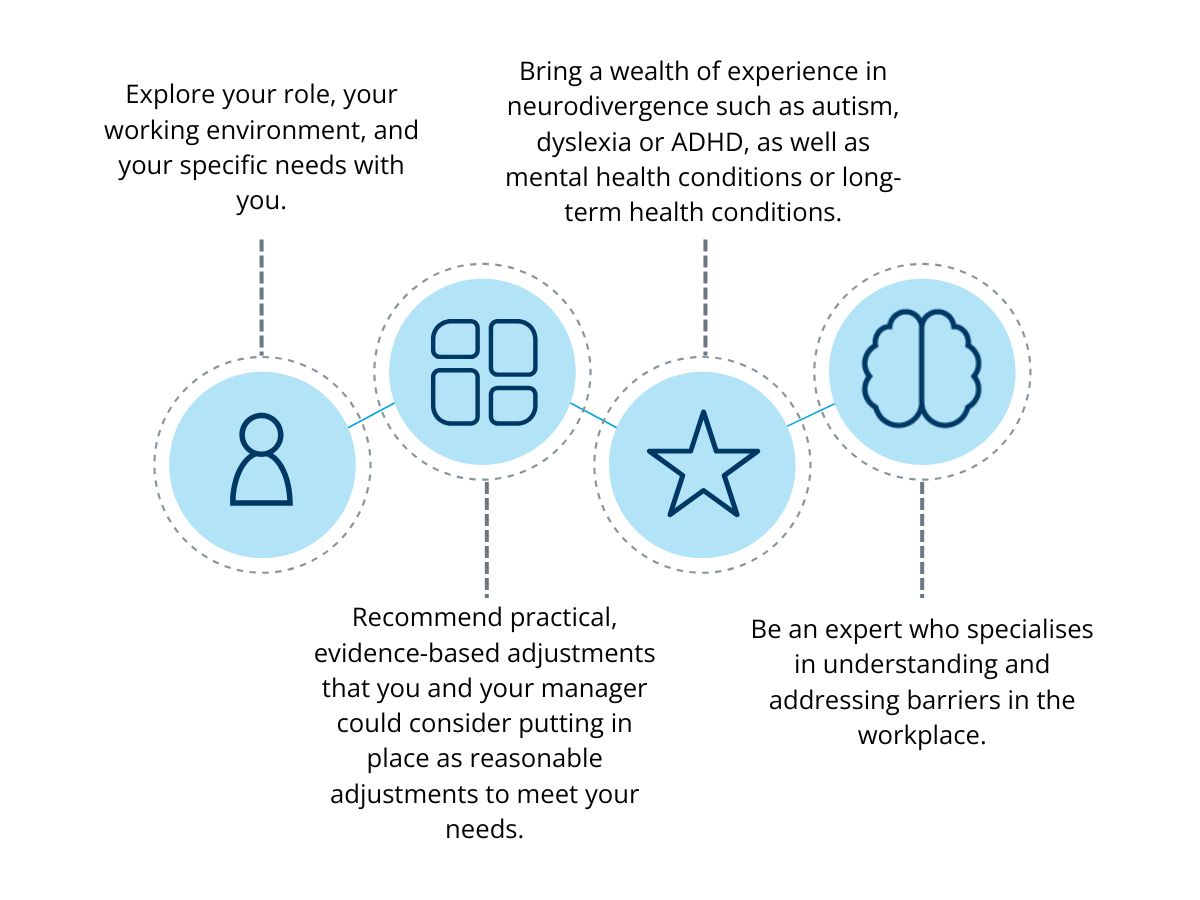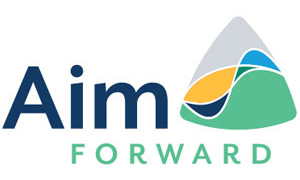Are you neurodivergent, have a mental health condition, a physical disability, or experience barriers that impact you in the workplace? Starting a conversation with your employer to understand what support or adjustments you need could help you thrive at work.
Neurodivergent diagnoses (such as dyslexia, ADHD or autism), mental health conditions (such as anxiety or depression) and long-term health conditions can present unique challenges in the workplace. Support isn’t just about improving your performance; it’s about creating an environment where you feel valued, understood, and able to bring your best self to work. In this blog, we’ll take you through our top tips and process to give you the confidence to ask for support at work.
Our top tips for requesting support at work
You may have the right to request reasonable adjustments at work, and the process shouldn’t feel like a legal or clinical process. This process is personal, and should be handled sensitively and with care. We find the best results start with open conversations, and the outcome is often enhanced well-being and productivity. Reasonable adjustments are legally protected under the Equality Act and designed to ensure that you can thrive in your role without unnecessary stress or disadvantage.
We understand that starting a conversation about support can feel overwhelming. Many people worry about being judged, misunderstood, or facing negative consequences. The truth is, most employers want to help and appreciate it when employees take the initiative to communicate their needs. Managers may feel worried that they don’t hold the right answers or level of knowledge in this area. However, the outcome of such conversations is commonly validating and empowering, and leads to a more positive and supportive work environment.
Following these tips can help you approach this sensitive topic with confidence and clarity.
1. Reflect on your needs
Before you start the conversation, take some time to reflect on what you truly need to feel supported at work. Ask yourself:
- Which tasks, environments, or interactions do you find particularly challenging?
- How do these challenges impact your performance or well-being?
- Are there specific adjustments that you think might help, such as assistive technology, or a quieter workspace?
If you can’t pinpoint any solutions right away, don’t worry. This stage is more about opening the door to adjustments and understanding what might be available or implementable from your employer.
2. Start a conversation
It’s natural to feel nervous about discussing something personal, but starting with a conversation can make the process less intimidating. You don’t need to dive into detail right away. You can start the conversation with something simple, for example: “I’ve been reflecting on ways I can feel more supported at work, and I’d love to have a conversation about how we can make some adjustments that will help me be at my best. Would you be open to discussing this?”
This approach is friendly and collaborative, and opens the door to further dialogue. You don’t need to share your full diagnosis unless you’re comfortable. You can focus on the specific challenges and adjustments that would help you without disclosing all the details of your condition or potential diagnosis.
3. Suggest a needs assessment
One of the most effective ways of getting support at work is by suggesting a workplace needs assessment.
This removes the pressure from you and your manager to come up with solutions on your own. Many managers can find this part of the process daunting. How can they be expected to know what could help? If you don’t experience the day-to-day impacts of a neurodivergence or mental health condition it can be difficult to pinpoint areas of the work environment to change.
In a workplace needs assessment, a specialist assessor will:

Here’s an example of how you could suggest a workplace needs assessment to your manager:
“I think a workplace needs assessment could be really beneficial. These assessments are carried out by professionals who specialise in neurodivergence and they can suggest adjustments that would help me remove barriers at work.”
You might like to share this download with them about how a workplace needs assessment can help you to identify strategies and reasonable adjustment recommendations, ultimately increasing your productivity and well-being.
4. Address concerns about judgement
It’s normal to worry about how your request might be perceived, especially if you’ve faced stigma in the past. Keep in mind that asking for support is a proactive and professional step. It shows self-awareness and a commitment to doing your best work.
Many people find that having this conversation leads to a sense of relief and validation. You may discover that your manager or HR team is not only open to providing support but actively wants to help you succeed.
Here are some things to keep in mind if you’re struggling with confidence:
- You’re advocating for yourself and your right to equal opportunities at work.
- Reasonable adjustments aren’t a “nice-to-have” – they’re a legal obligation.
So many other people have had similar conversations and found the process to be positive and empowering.
5. Frame the conversation as a collaboration
When speaking with your manager, position the discussion as a way to work together to improve your work experience. This creates a sense of partnership rather than confrontation. For example:
“I’d like us to explore how we can make my working environment a better fit for my needs. I think some small changes could help me contribute more effectively to the team.”
6. Involve HR or a trusted ally
If you feel nervous about approaching your manager directly, you can start with someone else you trust, such as an HR representative, a mentor, or a supportive colleague. They can offer guidance, attend meetings with you, or help communicate your needs.
If you feel a formal request would be more appropriate in your situation, then the example email template below could be used to request a meeting and suggest a workplace needs assessment:
Subject: Request for Meeting to Discuss Workplace Support
Dear [Manager’s Name],
I hope this message finds you well. I’d like to request a meeting to discuss how we can enhance my productivity and well-being in my role. I’ve been reflecting on areas where I face challenges, and I believe a workplace needs assessment could provide helpful insights into adjustments that would support me.
The purpose of this assessment is to identify strategies and potential reasonable adjustments that could help to overcome barriers in the workplace and help me contribute even more effectively to the team. I believe any potential recommendations would not only benefit my performance but also support the team’s overall success.
Could we schedule a time to meet and explore this further? I’m happy to accommodate your schedule and provide any additional details ahead of time.
Thank you for considering my request, and I appreciate your support.
Kind regards
[Your Name]
[Your Position]
Discover how a needs assessment with Aim Forward transformed Daryl’s experience with dyslexia at work. Read Daryl’s story
7. Focus on the benefits
When discussing adjustments, explain how they will help you and benefit the wider team. For example:
- A standing desk might reduce physical discomfort and improve focus.
- Noise-cancelling headphones could minimise distractions and boost productivity.
- Assistive technology like text-to-speech software could streamline tasks for someone with dyslexia.
By focusing on solutions and outcomes, you show initiative and make it easier for your employer to see the value of making adjustments.
8. Know your rights
It’s important to remember that you have legal protections under the Equality Act. Your employer is required to provide reasonable adjustments to support employees with neurodivergence, disabilities, and mental health conditions.
If you’re unsure about your rights or the process, we’re here to help. At Aim Forward, our experts ensure that adjustments meet legal requirements while focusing on solutions tailored to neurodivergent and disabled individuals.
9. Remember, asking for support is a strength
Advocating for yourself is a powerful act of self-awareness and resilience. The adjustments you request aren’t just about improving your experience, they also contribute to creating a more inclusive workplace for others who might experience similar challenges.
By taking action, you’re setting the stage for a more positive and fulfilling work life.
Working with Aim Forward to help you access support at work
Asking for support at work can feel like a big step, but it’s one that often leads to understanding, validation, and meaningful change. By starting a conversation, requesting a workplace needs assessment, and approaching the process collaboratively, you can create a workplace where you truly thrive.
At Aim Forward, we specialise in supporting individuals with a neurodivergence, mental or physical health condition. We can help you with solutions and strategies to work your way and excel.
If you’re ready to take the next step, get in touch to learn more about our expert workplace needs assessments. Let us help you and your employer create the adjustments you need to succeed.


Recent Comments